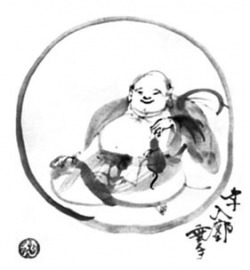Spiritual Development
Spiritual development happens as an individual becomes aware of, and then identifies with, increasingly larger, more complex structures. Starting with a selfish, immoral view of the individual out for him or herself alone, and developing to identification with the family, tribe or nation, and then on to more complex or "higher" concerns with all people, all life, all intelligence, all matter etc. The lower levels are generally "moral" behavior, that is behaving as to not hurt others, the middle stages conform to religious practice, and the higher ones mystical or transcendent positions.
The Power of Myth, Joseph Campbell
The book is based on a series of interviews of Campbell by Bill Moyers. In it Campbell explains the the value of myth is not on the surface; most myths are obviously not true in a literal sense. The value is at a deeper level. They describe - in a metaphorical, story form - some of the things that all humans go through: finding our place in the world, coming to grips with loss, who we are... |
|
The Eye of Spirit, Ken Wilber
The Eye of Spirit presents a complete description of Wilber's philosophy (at least as it was in the late '90's). Less heavily referenced than Sex, Ecology, Spirituality (described below), but still with hundreds of notes and sources. |
|
The Perennial Philosophy, Aldous HuxleyYes, the same Aldous Huxley that wrote Brave New World. Originally published in 1944, this anthology brings together short quotes from sources East and West to illustrate that the most fundamental aspects of spiritual experience are similar in all traditions. |
|
Religions, Values and Peak Experiences, Abraham MaslowDescribes "peakers" as people who directly experience transcendence or contact with God and non-peakers or people who set up and follow religions without the direct contact. |
|
Ken Wilber
Ken Wilber calls himself a mapmaker. His work has integrated sources from all ages and traditions into a coherent picture of spiritual development. He is the author of over 20 books and founder of the Integral Institute. The typical Wilber book is incredibly well researched with many references to source material and very detailed discussions of the topics involved.
One of his largest and most detailed efforts is Sex, Ecology, Spirituality (1995). At over 800 pages, with hundreds of references, it provides a strong foundation for understanding what has gone before and how these efforts can be brought together. The book discusses his four-quadrant system starting with a simple introduction and then adding details. See the Wikipedia article on Wilber.
His research covers cultural, social, behavioral and intentional development. The stages of development along these dimensions has been labeled by various philosophies and traditions over the centuries. Wilber selects a set of labels for each and sets them in four quadrants, see descriptions (and criticisms) at: http://www.kheper.net/topics/Wilber/Wilber_IV.html
What's important about Ken Wilber is not so much whether his map is perfectly correct or not, but that it provides a great starting point for further reading By placing sources on his map Wilber provides a larger framework of reality.
|
Not all of Wilber's books are as large, detailed (and intimidating) as SES. Some more accessible entry points are the audio CD's and DVD set: Kosmic Consciousness and The Integral Vision which present the results of Wilber's work without so much background. |
|
|
|
|
Eckhart TolleThe latest book by Eckhart Tolle - A New Earth - is very direct and simple to understand. It goes straight to the heart of spiritual development. The only unique terminology Tolle uses is his "pain body" for "an accumulation of old emotional pain". |
|
End Result of Spiritual Development

The end result of spiritual development is not separation from the everyday world, but a return to it. As described in the traditional ten "Ox Herding Pictures" the seeker progresses from not knowing the goal, to knowing what it is, to catching glimpses, to mastery and eventually, returning to the world not changed in some ways, but profoundly changed in others.
